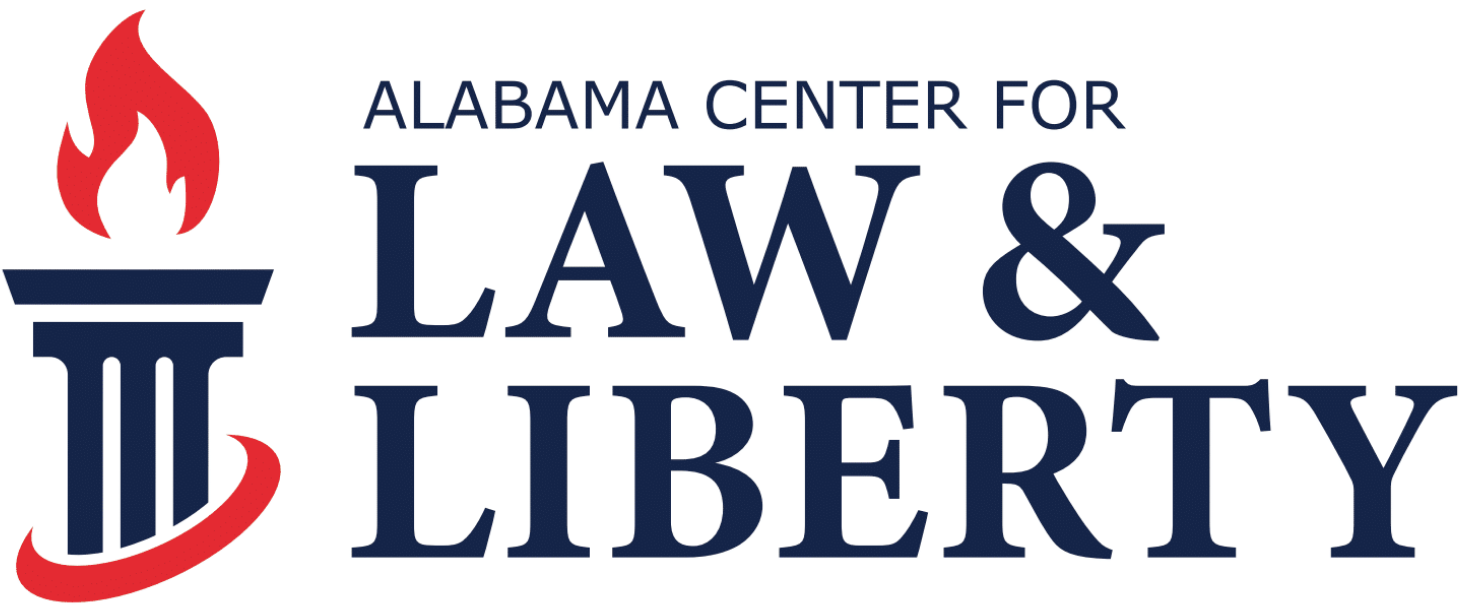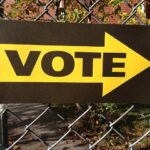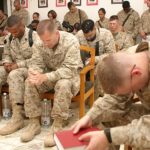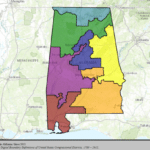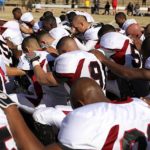Cases
Click to view the case overview including media and legal documents.
Active
Amicus
Alabama Supreme Court
Limited Government
After the 2020 elections, many Americans questioned how secure our country’s voting system really was. In May 2022, two candidates for Governor filed a lawsuit claiming that Alabama’s electronic voting machines had not been properly certified as the law requires. The gubernatorial candidates eventually dropped out, but a public-interest group and individual citizens remained on to press the case. The trial court eventually threw their lawsuit out, arguing that the voters did not have standing. The plaintiffs appealed, and ACLL filed an amicus brief supporting them.
Active
Amicus
United States Supreme Court
Strong Families; Limited Government; Free Markets
In Oregon, Aaron and Melissa Klein opened a bakery and used it to make wedding cakes. The Kleins are evangelical Christians who believe that God ordained marriage between a man and a woman and therefore cannot create custom cakes for same-sex weddings in good conscience. When a lesbian couple tried to hire the Kleins to make a cake for their wedding, the Kleins politely refused. That set off a nearly 10-year legal battle that has already been to the U.S. Supreme Court once. The case has now returned, and the Kleins are asking the Court to vindicate their religious liberty once and for all. ACLL filed an amicus brief supporting the Kleins.
Active
Amicus
United States Court of Appeals for the 11th Circuit
Limited Government; Free Markets
In the wake of the challenges that COVID-19 presented for the 2020 elections, the State of Florida passed common-sense voting reforms (such as requiring people to come into a voting precinct instead of using a drop box during regular voting hours). Florida was sued immediately, and four parts of the new voter law were enjoined by a district judge who held that the law discriminates against African-Americans. Florida appealed to the Eleventh Circuit. Because whatever decision the Eleventh Circuit made would impact similar Alabama laws, ACLL (teaming up with the American Constitutional Rights Union) filed a brief supporting Florida and arguing that the district court ignored the most relevant Supreme Court precedent addressing the issue, which would require the case to come out the other way.
Active
Amicus
U.S. Supreme Court
Limited Government; Free Markets
In Pennsylvania, a Christian named Gerald Groff, who worked for USPS, was fired for refusing to work on Sunday, which he believed to be a required Sabbath rest. The lower courts held that his employer did not violate Title VII’s command to offer a reasonable accommodation to employees because doing so would impose more than a de minimis cost to USPS. Groff asked the U.S. Supreme Court to take the case, arguing that the Supreme Court’s governing precedent, Trans World Airlines v. Hardison, does not do justice to the statute and should be overruled. ACLL filed an amicus brief focusing on the issue of stare decisis, arguing that the stare decisis factors weigh in favor of revisiting Hardison instead of keeping it.
Active
Amicus
U.S. Court Appeals for the 5th Circuit
Strong Families
In the fall of 2021, the Biden administration decided that all members of the military would have to get vaccinated against COVID-19. First Liberty Institute, representing a group of 35 Navy SEALS, brought a suit against the Biden administration when it refused to grant religious accommodations. The trial judge granted an injunction in favor of the plaintiffs, and the Biden administration appealed. ACLL had the honor of representing Lt. Gen. (ret.) Jerry Boykin, a founding member of the Delta Force who eventually became its commander, in an amicus brief explaining to the court that the SEALS could be accommodated without destroying the readiness of our special forces.
Active
Amicus
U.S. Court Appeals for the 11th Circuit
Strong Families
In 2022, the Alabama Legislature passed the Vulnerable Child Compassion and Protection Act, which prohibited physicians from giving children cross-sex hormones, puberty blockers, and sex reassignment surgeries in an effort to change a child’s sex. The State was sued, and the district court enjoined the State from forbidding hormones and puberty blockers. The district court reasoned that the law violated parental rights and the Constitution’s Equal Protection Clause. The State appealed to the Eleventh Circuit, and ACLL filed an amicus brief analyzing those two issues through a historical analysis.

Active
Amicus
U.S. District Court for the Middle of Alabama
Limited Government; Strong Families
In 2022, Eagle Forum of Alabama successfully lobbied the Alabama Legislature to pass the Vulnerable Child Compassion and Protection Act (“VCAP”), which prohibited Alabama doctors from giving minors struggling with gender dysphoria sex-altering surgeries, puberty blockers, or cross-sex hormones. The ACLU immediately sued, and Merrick Garland’s Justice Department jumped in. The Justice Department hit Eagle Forum of Alabama with a massive subpoena, requiring it to turn over virtually all documents and communications that went into lobbying for VCAP. Eagle Forum filed a motion to quash the subpoena, and ACLL joined an amicus brief, accompanied by 52 other conservative organizations and individuals, warning the court of the free speech violations that the DOJ was imposing through this inquisition. Fortunately, the judge agreed and quashed the subpoena.
Active
Amicus
U.S. Courts of Appeals for the 11th Circuit
Limited Government
In the fall of 2021, the Biden administration decided that all members of the military would have to get vaccinated against COVID-19. Liberty Counsel, representing a group of Navy SEALs and other military personnel, brought a suit against the Biden administration when it refused to grant religious accommodations. The trial judge granted an injunction in favor of the plaintiffs, and the Biden administration appealed. ACLL filed a friend-of-the-court brief in the Eleventh Circuit arguing that the injunction should remain in place.
WON
Amicus
U.S. Supreme Court
Limited Government; Free Markets; Strong Families
In Colorado, a Christian creative professional named Lorie Smith creates websites for couples who are getting married. Lorie uses her artistic creative skills to help people celebrate that monumental day. But as a Christian, she does not believe that she can put her talents to work to celebrate same-sex weddings in good conscience. The State of Colorado has told her that she either needs to cater to same-sex weddings or get out of the wedding business altogether. Lorie’s case eventually reached the Supreme Court, which agreed to hear it on February 22, 2022. ACLL filed a friend-of-the-court brief arguing that while public-accommodation laws (such as the Colorado law at issue here) serve valid purposes, they are still subject to constitutional guarantees such as free exercise of religion and freedom of speech.
Active
Amicus
Alabama Supreme Court
Limited Government; Free Markets
Across the country, public universities are subjecting their students to unconstitutional speech policies. That happened here in Alabama, when the Young Americans for Liberty’s UA Huntsville wanted to discuss political ideas without getting permission from the university first. Because this violated UAH’s speech code, the YAL chapter sued, represented by Alliance Defending Freedom. After the trial court dismissed its case, the chapter appealed to the Alabama Supreme Court. ACLL filed an amicus brief with the Alabama Supreme Court, arguing that the Alabama Constitution’s Free Speech Clause protects the People from prior restraints on speech.
Active
Counsel
Montgomery Circuit Court
Limited Government; Free Markets
In 2020, State Health Officer Scott Harris began issuing orders restricting certain businesses from operating, and requiring some to close, when COVID-19 hit Alabama. Governor Kay Ivey eventually joined his efforts to restrict businesses. One of those businesses was Uncorked Providence, a wine-tasting shop in Huntsville, which was owned by Saranne Riccio. A Johns Hopkins study found that such orders had little effect on slowing the spread of COVID but had disastrous impacts on the economy. Because of Harris and Ivey’s orders, Uncorked Providence was forced to go out of business. ACLL is representing Riccio and Uncorked Providence, seeking damages arising from Harris and Ivey’s orders. ACLL is seeking not only justice for its clients but also to set a precedent that the doctrine of separation of powers is still the law in Alabama.
Active
Amicus
United States Courts of Appeals for the District of Columbia Circuit
Limited Government
In 1972, Congress sent the Equal Rights Amendment to the States for ratification but imposed a 7-year deadline. It fell three votes short of ratification. But drawing on the success of the 27th Amendment’s ratification, three states with liberal leadership voted to ratify the ERA from 2017-2020. These states then sued to have the ERA recognized as the 28th Amendment. The United States District Court for the District of Columbia dismissed their case, and they appealed to the D.C. Circuit, which is often considered the second most powerful court in the country. Gregory Watson (pictured above), who led the charge to ratify the 27th Amendment, wanted to participate in the case and tell the court that ratifying the ERA is not the same as ratifying the 27th Amendment. He asked ACLL to represent him, and ACLL submitted an amicus brief on his behalf to the D.C. Circuit.
Active
Amicus
United States Supreme Court
Limited Government
After the 2020 Census, Alabama redrew its congressional district maps to reflect the changes in population since the last census. Although it made only slight changes to its previous congressional map, the ACLU sued the State, claiming that the maps violated the Voting Rights Act. A three-judge panel of the United States District Court for the Northern District of Alabama agreed, reasoning that the State had to draw two majority-black districts or something close to it. The State appealed to the U.S. Supreme Court, and ACLL filed an amicus brief in its support. ACLL argued that neither the Voting Rights Act nor the Constitution require the State to intentionally discriminate on the basis of race in how it draws congressional lines. The Supreme Court issued a stay in Alabama’s favor and is now considering the merits stage.
Active
Amicus
United States Supreme Court
Limited Government
Coach Joe Kennedy, a Christian and ex-Marine, had the custom of taking a knee and praying at the 50-
yard line after every public high school football game that he coached. The school district eventually
fired him for this practice, claiming that as a government employee, his conduct violated the
Establishment Clause of the First Amendment. The Supreme Court of the United States has now agreed
to hear his case. While Coach Kennedy’s lawyers have been arguing primarily that the Free Speech
Clause protected his actions, ACLL is arguing that the Establishment Clause does not prohibit Coach
Kennedy’s right to publicly pray at the 50-yard line after the game.
Closed
Amicus
Alabama Supreme Court
Limited Government; Strong Families
At the beginning of the 2021 school year, the Jefferson Board of Education imposed a mask requirement for children in public schools. Adam Waldrop sued to enjoin the mask mandate, advocating for personal choice. When his case was appealed to the Alabama Supreme Court, ACLL filed an amicus brief supporting him, explaining that the parental rights recognized by the United States Supreme Court and Alabama Supreme Court leave the decisions of a child’s healthcare up to the parents and not the schools, unless the schools can prove by clear and convincing evidence that such measures are necessary.
Active
Counsel
U.S. District for the Northern District
Limited Government; Strong Families
In the fall of 2021, United Launch Alliance, a company doing business in Decatur, Alabama, announced that it would require its employees to get vaccinated against COVID-19. While the initial announcement said that employees would be allowed to apply for religious and medical exemptions, by the time that the mandate was implemented, it appeared that the company was not granting exemptions. Part of the company’s justification for denying the exemptions was that it was too hard on the company, but it also stated that less than 1% of its employees were unvaccinated. Due to ULA’s failure to accommodate its employees’ requests, ACLL filed a class-action suit on behalf of five ULA employees whose requests were denied and on behalf of all ULA employees similarly situated.
WON
Counsel
U.S. Courts of Appeals for the 11th Circuit
Limited Government; Strong Families
In September 2021, President Biden announced that the Occupational Safety and Health Administration (“OSHA”) would issue an emergency rule forcing businesses that employed 100 people or more to vaccinate their employees. When OSHA issued its rule in November, ACLL sued on behalf of FabArc Steel Supply, Inc., an Alabama company that did not want to follow the vaccine mandate. Additionally, FabArc’s President and shareholder with majority voting power, Tony Pugh, had religious objections to implementing the vaccine. Thus, ACLL filed a petition for review with the U.S. Court of Appeals for the Eleventh Circuit, challenging the validity of the mandate.
Closed
Amicus
Circuit Court of Madison County
Limited Government; Strong Families
At the beginning of the 2021 school year, the Huntsville Board of Education imposed a mask requirement for children in public schools. Joshua Ulrich (pictured above), a father with children in the school system, sued to enjoin the mask mandate, advocating for personal choice. ACLL filed an amicus brief supporting him, explaining that the parental rights recognized by the United States Supreme Court and Alabama Supreme Court leave the decisions of a child’s healthcare up to the parents and not the schools, unless the schools can prove by clear and convincing evidence that such measures are necessary.
Closed
Amicus
U.S. Courts of Appeals for the 11th Circuit
Strong Families; Limited Government
In 2014, an abortion provider in Montgomery sued the State to enjoin an Alabama law that, among other things, guaranteed that unborn children had a lawyer to represent them in judicial proceedings where a minor was seeking an abortion. The district court declared this part of the law unconstitutional, and a panel of the U.S. Court of Appeals for the Eleventh Circuit affirmed. The State asked the entire Eleventh Circuit to rehear the case, and ACLL filed an amicus brief in its support, arguing that giving the baby a lawyer was not only permissible under Roe v. Wade and its progeny but also that doing so was an essential step towards recognizing the personhood of the unborn.
WON
Amicus
U.S. Supreme Court
Strong Families; Limited Government
In 2018, Mississippi enacted a law that prohibited abortions after 15 weeks. Mississippi’s sole abortion provider sued, arguing that this law violated Roe v. Wade and its progeny. The trial court agreed, and the Fifth Circuit affirmed on appeal. Mississippi asked the Supreme Court to take the case, and it agreed. The Court limited the question presented to whether all bans on abortion before the point of viability are unconstitutional. ACLL filed an amicus curiae brief making two points. First, the viability standard should be discarded because it is illogical and does not comport with other areas of the law. Second, the Court should not only reconsider the viability standard itself, but it should also take this opportunity to reconsider its abortion decisions altogether and throw out Roe and its progeny.
WON
Amicus
U.S. Supreme Court
Limited Government
The State of New York does not allow its people to openly carry firearms, and it issues concealed carry licenses only for “proper cause.” In 2018, the New York State Rifle & Pistol Association (“the Association”) sued the State over the constitutionality of its scheme after it denied concealed carry permits to some of its members. The Association lost in the lower courts, but the Supreme Court agreed to take the case. The question before the Court is whether New York violated the Second Amendment by denying Petitioners’ applications for concealed carry permits. ACLL submitted an amicus curiae brief making two points. First, a State violates the Second Amendment if its restrictions on carrying firearms cut off an average citizen’s right to carry a handgun for self-defense, which it has done here. Second, if the Court adopts any test to govern the time, place, and manner of carrying arms, then it should adopt the time, place, and manner test it uses in free speech cases. Under that framework, any government regulation of the manner of carrying firearms that fails to leave open ample alternative methods of carrying guns would violate the Second Amendment.
Closed
Amicus
U.S. Supreme Court
Limited Government; Free Markets
In 2019, several Puerto-Ricans sued the United States for outlawing cockfighting in Puerto Rico. The United States defended its law by arguing that the Constitution’s Commerce Clause gave it authority to legislate in this area, and the lower courts agreed. The petitioners asked the United States Supreme Court to take the case, arguing that this fell outside the scope of the Commerce Clause. ACLL filed an amicus curiae brief on behalf of Jeffrey C. Tuomala, Professor of Constitutional Law at the Liberty University School of Law. This brief explained how the Court has lost track of the Commerce Clause’s meaning and has twisted it to justify a runaway federal government that has greatly overstepped its bounds. Since we now have the most conservative Supreme Court in nearly a century, we urged the Court to return to the original meaning of the Commerce Clause, which would reign in much of the federal government’s usurpation of states’ rights.
Active
Amicus
U.S. Courts of Appeals for the 11th Circuit
Strong Families
In 2018, the ACLU brought an equal protection challenge to an Alabama order requiring each person’s driver’s license to reflect his or her biological sex. The ACLU claimed that this order unconstitutionally discriminated against transgender people. The trial judge ruled in their favor, supposedly based on the Supreme Court’s sex-discrimination precedents. Alabama appealed to the U.S. Court of Appeals to the Eleventh Circuit, and the Alabama Center for Law and Liberty filed a friend-of-the-court brief in its support. We argued that there is no unconstitutional sex discrimination in this case because the order applies equally to both sexes. More fundamentally, we reminded the court that it cannot interpret the Equal Protection Clause correctly without remembering its purpose: securing the God-given natural rights of every person. With that in mind, the Equal Protection Clause does not protect the right to change one’s sex.
Alabama Center for Law & Liberty 2213 Morris Ave, Floor 1 Birmingham, AL 35203 256-530-0519
The Alabama Center for Law and Liberty is Christian non-profit law firm.
©Alabama Center for Law & Liberty. All rights reserved.
